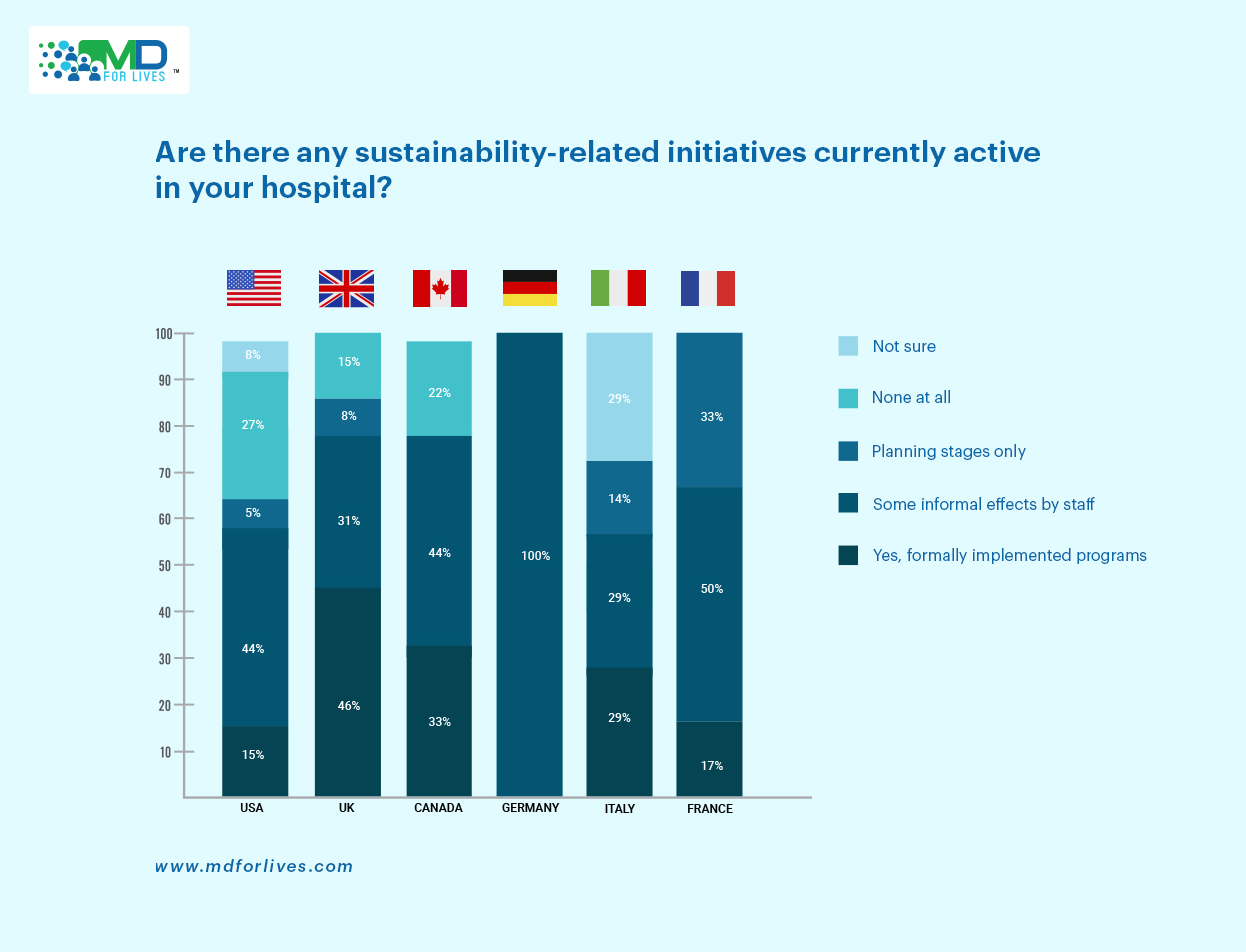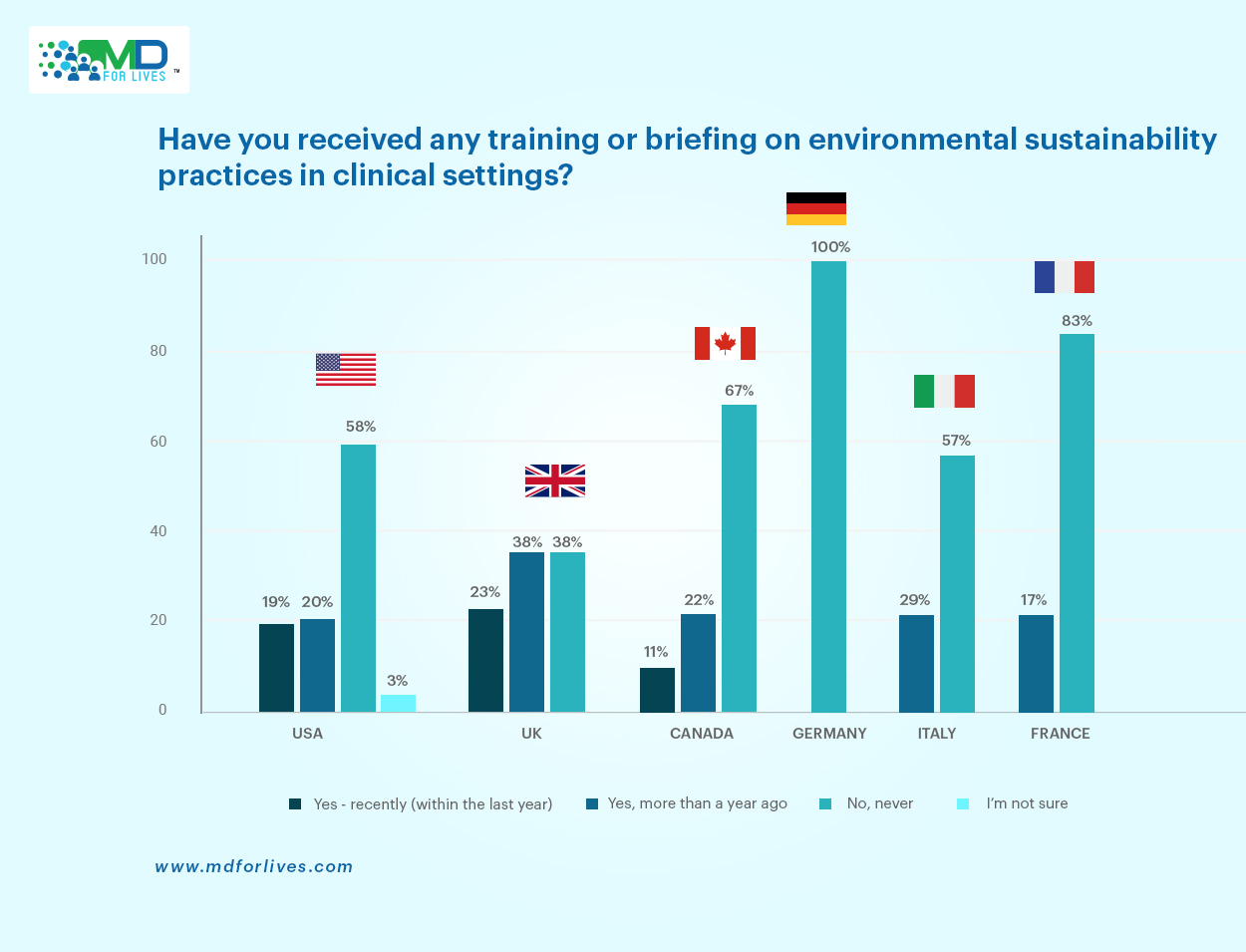Healthcare is meant to heal. But what if, in striving to save lives, the very system we trust is inadvertently damaging the planet? From the daily use of single-use gowns, gloves, masks, and sterile packaging to energy-intensive operations and inefficient waste disposal systems, the environmental toll of modern medicine is growing (and growing fast). What was once considered essential for hygiene and safety is now contributing to an unsustainable legacy of plastic waste, overflowing landfills, and rising healthcare-related carbon emissions.
The irony is clear, in our pursuit of health, we are compromising planetary well-being.
To better understand this paradox, we turned to those on the frontlines, physicians, whose decisions shape clinical care every day. We surveyed 8000+ healthcare professionals from six of the world’s most influential and developed healthcare systems: the United States, the United Kingdom, France, Germany, Italy, and Canada.
Their perspectives offer rare and candid insight into the everyday sustainable healthcare challenges within hospitals.
Million Dollar Question: Are Hospitals Prioritizing ‘Sustainable Healthcare’?
When it comes to sustainable healthcare, especially in case of procurement and operations, the first thought that must strike one is – “Are hospitals truly prioritizing it?” Well, ideally, they should.
When we surveyed our panelists, the results were not positive.
When asked whether their healthcare facilities prioritize environmental sustainability in healthcare (especially in procurement and operations), just over half of physicians surveyed gave a cautiously optimistic response. Only 17% of respondents said their institutions prioritize sustainable health practices “very much,” showing that strong, committed leadership remains rare. A larger share, 40%, said their facilities focus on it “somewhat,” pointing to a moderate but inconsistent effort.

At the other end of the spectrum, 31% of respondents said their facilities were “not really” focused on sustainable health practices, and another 11% said “not at all.” A small group (2%) remained unsure.
This middle-ground sentiment signals opportunity. Physicians see sustainability entering the conversation, but real investment and leadership commitment are still lagging. Therefore, it is clear that healthcare systems must move from intention to implementation.
Sustainable Healthcare: Active Efforts Missing in Many Countries
It is good to learn that more than half (57%) of our panelists have responded that their hospitals are giving sustainable healthcare the attention it deserves (or at least trying to) in procurement and operations. But that leads us to a bigger, more important question: Are these hospitals doing something about it?
Are sustainability efforts visible, consistent, and embedded in the day-to-day functioning of departments? Let us look at the insights!

The UK leads the way in sustainable development in healthcare, with 46% of respondents saying their hospitals have formal programs in place. These include things like eco-friendly purchasing and organized recycling efforts. Canada follows with 33%, where hospitals are also taking clear steps toward sustainability.
The U.S., on the other hand, has some catching up to do. Only 15% reported formal programs. However, 44% mentioned that staff are taking informal steps to be more eco-friendly, showing a positive shift at the grassroots level.
In Italy and France, sustainable development in healthcare is still mostly in discussion. Just 29% of Italian and 17% of French respondents reported having formal programs. That said, 14% in Italy and 33% in France said their hospitals are planning to start such initiatives. But here is something to worry about – 29% of Italian respondents were not even sure if anything was happening! This shows that hospitals may not be clearly communicating their sustainability-related efforts to staff.
What is unique: Germany stands out for a different reason. While no formal programs were reported, 100% of respondents mentioned informal efforts led by staff who care deeply about the environment. These bottom-up actions show that change is possible, even without official support.
All in all, these insights underscore striking disparity. While some nations lead sustainable healthcare practices (actively), others remain in preliminary stages or lack visibility.
The Real Roadblock to Sustainable Healthcare – Finally Found!
Hospitals globally are aware that ‘Sustainable Healthcare’ plays a crucial role. Yet, in many nations, sustainable efforts are not initiated actively (as mentioned in the previous para). Why so? Many think it is the cost, or because of lack of infrastructure. But in reality, it is the lack of education.
Shocking? Not really.
Sustainable development in healthcare need not be just policies and programs. They also require awareness and education.

In the UK, the momentum is clear. Only 23% of respondents have received some form of sustainable healthcare training within the past year and another 38% earlier (a year ago). This shows that for many UK healthcare professionals, conversations around climate-conscious care are not new. They have already started integrating those ideas into practice.
Across the Atlantic, the U.S. reflects a similar trend, though with slightly less reach. 19% of American physicians said they had received training recently, and 20% more than a year ago. While that is promising, it still leaves a majority without formal guidance on how to make their care more environmentally responsible.
Progress appears sluggish in both Canada and Italy. Just 11% of Canadian respondents, and none in Italy, reported receiving sustainability training within the past year. While 22% in Canada and 29% in Italy recall having attended training sessions in the past, the overall numbers point to a clear gap. Sustainability education has yet to be fully integrated into routine clinical development in these countries.
The scenario is even more concerning in France, where 83% of respondents said they have never been trained on sustainability at all. But the most striking gap is in Germany, where 100% of respondents said they had never received any kind of environmental training in their clinical roles.
What this reveals is a global disconnect. Sustainable healthcare programs may exist on paper, but if the people delivering care are not informed or empowered to act, the impact will be limited. True change requires more than policy; it needs people. And that starts with making sustainable or eco-friendly healthcare a part of everyday training, everywhere.
Final Takeaway
“You can’t practice what you’ve never been taught.”
This simple truth echoes across borders, from bustling U.S. hospitals to quieter European wards. While sustainable healthcare policies may exist on paper, their power lies in the hands of healthcare professionals equipped with knowledge, not just responsibility.
Our survey reveals an uncomfortable truth: it is not the lack of funding or fancy infrastructure holding us back; it is the lack of education. How can we expect physicians to lead the change if no one ever shows them the way?
If we genuinely want a healthier planet, we must start by empowering the people at the heart of healthcare. It is time to turn awareness into action.
If you want to bring in the change and lead the way, do share this insightful article with your peers on social media and tag us – @MDForLives.

MDForLives is a vibrant community of healthcare professionals and patients dedicated to shaping the future of healthcare. We provide valuable global insights to healthcare companies through online surveys, interviews, and discussion forums.






